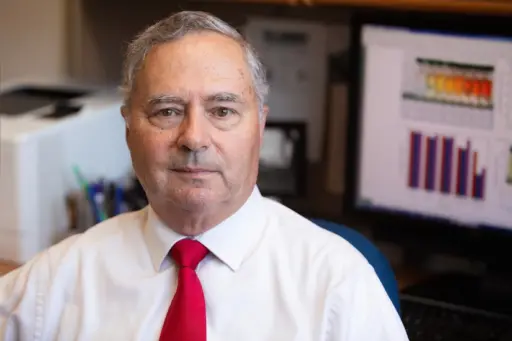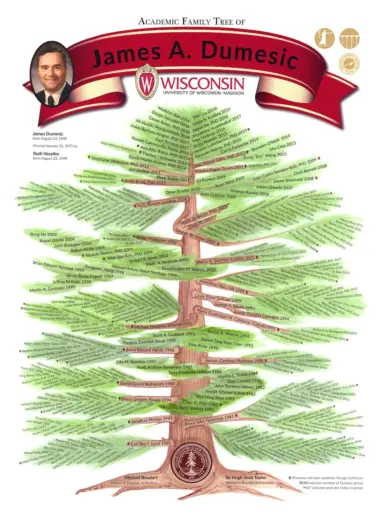In late November 2019, Ernest Micek Distinguished Chair in Chemical and Biological Engineering Jim Dumesic had a family reunion of sorts. Almost half of the 70 PhD students he’s advised over the past 45 years, many of his postdocs, as well as colleagues and friends, came to Madison to celebrate his retirement at the Olaf A. Hougen Symposium. “Everyone was there, from my first PhD student over 40 years ago to students who just graduated,” Dumesic says. “It was very special.”
 James Dumesic
James Dumesic
While the number of former students who attended the “reunion” was meaningful for Dumesic, the caliber of people who have worked under him over the past five decades is what was most impressive. Dumesic’s academic family tree is a Who’s Who of notable academic and industry researchers in heterogeneous catalysis and biofuels. In fact, at the symposium, he received a framed academic family tree showing just how far his influence stretches into the world of chemical engineering.
Among those who returned for the celebration were Bruce Tatarchuck, one of Dumesic’s first PhD students who has spent his career at Auburn University, where he holds the Charles E. Gavin III Endowed Chair in Chemical Engineering and is director of the Center for Microfibrous Materials Manufacturing. Then there’s Michael Amiridis, who earned his PhD under Dumesic in 1991. He went on to become the dean of the College of Engineering and Computing at the University of South Carolina at Columbia before becoming the chancellor of the University of Illinois-Chicago in 2015. Carl Lund (PhD ’81) is the former chair of the chemical engineering department at the University at Buffalo and is currently that school’s inaugural chair of the Department of Engineering Education.
 James Dumesic’s academic family tree.
James Dumesic’s academic family tree.
Dumesic’s steady mentoring of grad students means his legacy stretches from researchers on the brink of retirement to those just starting their careers. Yuriy Román (PhD ’08), who is a tenured professor, runs his own lab at MIT where he studies biomass conversion, catalysis of microparticles and other topics. George Huber (PhD ’05) studies the conversion of biomass into green fuels and is now the Richard L. Antoine Professor at UW-Madison with an office down the hall from Dumesic’s. Many other mid-career researchers who studied under Dumesic have positions across the U.S. as well as Mexico, Switzerland, Singapore and Brazil.
More recent grads are just starting their journey, like Siddarth H. Krishna (PhD ’19), now Henson Postdoctoral Research Fellow at the Purdue Catalysis Center. Working under Dumesic, he says, was the perfect balance between mentorship and self-motivation. “He has a knack for providing just the right amount of guidance. Sometimes, he would respond, ‘Hmmm … I don’t know,’ to a research question, encouraging me to come to a path forward and become more independent,” he says. “Only once I came up with my own hypotheses he would finally share what he was thinking in the first place. Despite his poker face, I don’t think any of his students have doubted how deeply invested he is in them.”
That includes those who choose to enter industry after receiving their degrees; that number includes more than half of Dumesic’s PhD graduates. His students work at companies including 3M, Shell, IBM, Dow, Union Carbide, GE Plastics, Proctor & Gamble and other major corporations in the chemical industry.
Woody Shiflett (PhD ’81) has worked a variety of jobs over the decades, including at Shell, Criterion Catalysts and Chevron, and soon will start his own consulting business. Besides the technical skills he gained working with Dumesic, he says his advisor’s way of managing the people working for him has stuck with him. “Part of what gives you the tools to be successful in a technical career is a collaborative approach to people,” he says. “I don’t know where Jim got his people skills from, but it must be a good set of genes or a good set of experiences, or both.”
No matter where his students have ended up, the lessons they learned within Dumesic’s research group have served them well and informed how they interact with their own employees and students. At the symposium, Shiflett says he met a recent grad who had the same type of interactions with Dumesic that he himself had 40 years before. “If Jim asked a question, and you got it wrong, he would say, ‘Well, almost,’ and turn it into a multiple choice or true-false question,” says Shiflett. “He never made you feel dumb because you didn’t know something. He’d say, ‘Well, okay, let’s look at it this way.”
Josephine Hill (PhD ’99), a professor in the Department of Chemical and Petroleum Engineering at the University of Calgary, says that Dumesic has his own method of inspiring students, and it’s one reason so many returned to Madison to honor him. “He has a quiet way, but he was able to motivate some of us to really want to do more,” she says. “There was this sense at the Hougen Symposium that we’re all proud of him for what he has accomplished and are proud to be associated with his name. And there’s a sense of wanting him to be proud of us as well.”